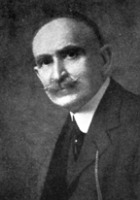Arthur Wentworth Hamilton Eaton
Arthur Wentworth Hamilton Eaton Poems
PROUD, languid lily of the sacred Nile,
'Tis strange to see thee on our western wave,
Far from those sandy shores that mile on mile,
Papyrus-plumed, stretch silent as the grave.
...
WITH subtlest mimicry of wave and tide,
Of ocean storm, and current setting free,
Here by the bridge the river deep and wide,
Swaying the reeds along its muddy marge,
...
PROUD, languid lily of the sacred Nile,
'Tis strange to see thee on our western wave,
Far from those sandy shores that mile on mile,
Papyrus-plumed, stretch silent as the grave.
...
'TIS the laughter of pines that swing and sway
Where the breeze from the land meets the breeze from the bay;
'Tis the silvery foam of the silver tide
In ripples that reach to the forest side;
...
PRAY for the dead—who bids thee not?
Do all our human loves grow pale,
Or are the old needs all forgot
When men have passed within the veil?
...
WITH tangled brushwood overgrown,
And here and there a lofty pine,
Around whose form strange creepers twine,
And crags that mock the wild sea's moan,
...
Arthur Wentworth Hamilton Eaton Biography
Arthur Wentworth Hamilton Eaton poet, priest, educator and historian, was born at Kentville, Nova Scotia, the eldest son of William Eaton, a descendant of a Puritan family and at one time Inspector of Schools for his county, and Anna Augusta Willoughby Hamilton, of New England Puritan stock. His higher education was received at Dalhousie College, Halifax, and at Harvard University where he graduated in arts with the class of 1880. [Of this class, Theodore Roosevelt was a member. The honorary degree, D.C.L., was conferred on him in 1905, by King's College University, in recognition of his literary achievements and high scholastic attainments. Ordained deacon of the Protestant Episcopal Church, in 1884, and priest the next year, he was, for a time, incumbent of the parish of Chestnut Hill, Boston. In 1888, Dr. Eaton's first notable work, The Heart of the Creeds: Historical Religion in the Light of Modern Thought, was published. This was followed, in 1889, by his first book of verse, Acadian Legends and Lyrics, so favourably reviewed by the critics. His third publication, The Church of England in Nova Scotia, and the Tory Clergy of the Revolution, a permanently valuable historical work, was issued in 1891. His historical researches have resulted also in a number of authoritative genealogical and family monographs, in the History of King's County, N.S.: Heart of the Acadian Land, and in an important History of Halifax, Nova Scotia, now being published in instalments, in 'Americana.' Two other volumes of verse appeared in 1905,–Acadian Ballads, and De Soto's Last Dream, and Poems of the Christian Year–and, in 1907, was published The Lotus of the Nile and Other Poems. As Professor of English Literature for years, in a New York college, Dr. Eaton gained a wide reputation as an educator. Dr. Eaton has made an enviable record as a Canadian litterateur. His Legends and Ballads must continue to hold their distinctive place in Canadian verse whilst his historical writings must ever increase in value and importance.)
The Best Poem Of Arthur Wentworth Hamilton Eaton
The Lotus Of The Nile
PROUD, languid lily of the sacred Nile,
'Tis strange to see thee on our western wave,
Far from those sandy shores that mile on mile,
Papyrus-plumed, stretch silent as the grave.
O'er limpid pool, and wide, palm-sheltered bay,
And round deep-dreaming isles, thy leaves expand,
Where Alexandrian barges plough their way,
Full-freighted, to the ancient Theban land.
On Karnak's lofty columns thou wert seen,
And spacious Luxor's temple-palace walls,
Each royal Pharaoh's emeralded queen
Chose thee to deck her glittering banquet halls;
Yet thou art blossoming on this fairy lake
As regally, amidst these common things,
As on the shores where Nile's brown ripples break,
As in the ivory halls of Egypt's kings.
Thy grace meets every passer's curious eyes,
But he whose thought has ranged through faiths of old
Gazing at thee feels lofty temples rise
About him, sees long lines of priests, white-stoled,
That chant strange music as they slowly pace
Dim-columned aisles; hears trembling overhead
Echoes that lose themselves in that vast space,
Of Egypt's solemn ritual for the dead.
Ay, deeper thoughts than these, though undefined,
Start in the reflective soul at sight of thee,
For this majestic orient faith enshrined
Man's yearning hope of immortality.
And thou didst symbolize the deathless power
That under all decaying forms lies hid,
The old world worshipped thee, O Lotus flower,
Then carved its sphinx and reared its pyramid!
